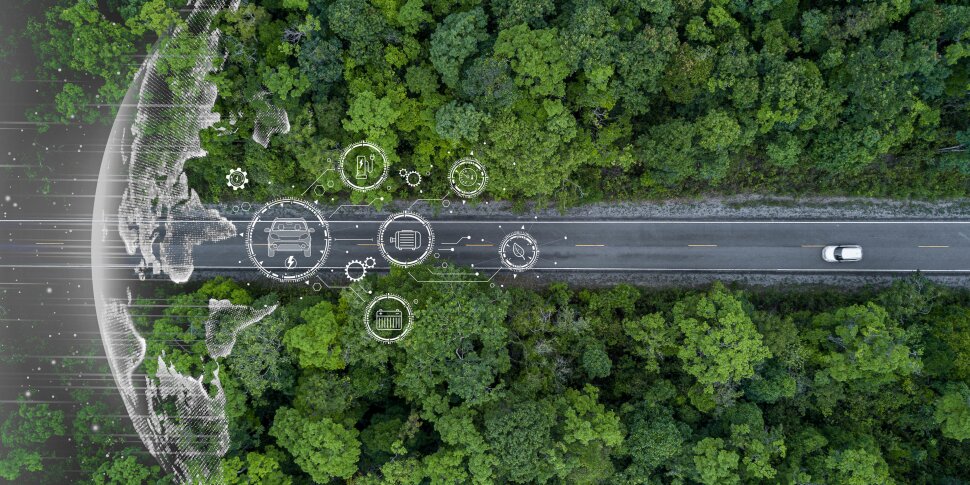Comparative Perceptions Influence Actions on Climate Change Between Eastern and Western Europeans
Downloads
Doi:10.28991/HEF-2024-05-03-03
Full Text:PDF
Downloads
United Nations. (2022) Climate Action: What is climate change? United Nations, New York, United States. Available online: https://www.un.org/en/climatechange/what-is-climate-change (accessed on June 2024).
The Royal Society. (2020). Climate Change Evidence & Causes Update 2020: An overview from the Royal Society and the US National Academy of Sciences, United Kingdom. Available online: https://royalsociety.org/news-resources/projects/climate-change-evidence-causes/ (accessed on June 2024).
W.H.O. (2023) Climate change. World Health Organization (WHO), New York, United States. Available online: https://www.who.int/news-room/fact-sheets/detail/climate-change-and-health (accessed on July 2024).
Copernicus. (2023). Copernicus: 2023 is the hottest year on record, with global temperatures close to the 1.5°C limit. Copernicus Climate Change Service. Available online: https://climate.copernicus.eu/copernicus-2023-hottest-year-record (accessed on July 2024).
NCEI (2024). Assessing the global climate in 2023. National Center of Environmental Information, North Carolina, United States. Available online: https://www.ncei.noaa.gov/news/global-climate-202312 (accessed on July 2024).
Andre, P., Boneva, T., Chopra, F., & Falk, A. (2024). Globally representative evidence on the actual and perceived support for climate action. Nature Climate Change, 14(3), 253–259. doi:10.1038/s41558-024-01925-3.
Hornsey, M. J., & Fielding, K. S. (2020). Understanding (and Reducing) Inaction on Climate Change. Social Issues and Policy Review, 14(1), 3–35. doi:10.1111/sipr.12058.
Venghaus, S., Henseleit, M., & Belka, M. (2022). The impact of climate change awareness on behavioral changes in Germany: changing minds or changing behavior? Energy, Sustainability and Society, 12(1), 8. doi:10.1186/s13705-022-00334-8.
Vieira, J., Castro, S. L., & Souza, A. S. (2023). Psychological barriers moderate the attitude-behavior gap for climate change. PLOS ONE, 18(7), 287404. doi:10.1371/journal.pone.0287404.
Weber, E. U. (2010). What shapes perceptions of climate change? Wiley Interdisciplinary Reviews: Climate Change, 1(3), 332–342. doi:10.1002/wcc.41.
Swim, J., Clayton, S., Doherty, T., Gifford, R., Howard, G., Reser, J., Stern, P., & Weber, E. (2009). Psychology and Global Climate Change: Addressing a multi-faceted Phenomenon and Set of Challenges. American Psychologist, 403(1), 1-230.
Clayton, S., Devine-Wright, P., Stern, P. C., Whitmarsh, L., Carrico, A., Steg, L., Swim, J., & Bonnes, M. (2015). Psychological research and global climate change. Nature Climate Change, 5(7), 640–646. doi:10.1038/nclimate2622.
European Union. (2021). Special Eurobarometer 513: Climate Change Report Fieldwork: March - April 2021. doi:978-92-76-38399-4.
Leiserowitz, A., Carman, J., Buttermore, N., Neyens, L., Rosenthal, S., Marlon, J., Schneider, J., & Mulcahy, K. (2022). International Public Opinion on Climate Change, 2022. New Haven, CT: Yale Program on Climate Change Communication and Data for Good at Meta, United States. Available online: https://climatecommunication.yale.edu/wp-content/uploads/2022/06/international-public-opinion-on-climate-change-2022a.pdf (accessed on July 2024).
EIB. (2023). 2022-2023 EIB climate change survey. European Investment Bank, Kirchberg, Luxembourg. Available online: https://www.eib.org/en/surveys/climate-survey/5th-climate-survey/index.htm (accessed on July 2024).
Solomon, P. R. (1987). Review of Psychology: The Science of Mind and Behavior. Contemporary Psychology: A Journal of Reviews, 32(4), 387-387. McGraw-Hill Humanities/Social Sciences/Languages, United States. doi:10.1037/027051.
Mauldin, K. (2013). Cognitive Psychology. Encyclopaedia of Human Memory: 3. Oxford University Press, Oxford, England. doi:10.5840/thought1940152181.
Morvan, C., & O'Connor, A. J. (2017). A theory of cognitive dissonance. In A Theory of Cognitive Dissonance. Stanford University Press. doi:10.4324/9781912282432.
Kahneman, D., & Tversky, A. (1972). Subjective probability: A judgment of representativeness. Cognitive Psychology, 3(3), 430–454. doi:10.1016/0010-0285(72)90016-3.
Haselton, M. G., Nettle, D., & Andrews, P. W. (2015). The Evolution of Cognitive Bias. In B. D.M (Ed.), The Handbook of Evolutionary Psychology, 724–746. doi:10.1002/9780470939376.ch25.
Howard, J. A. (1985). Further Appraisal of Correspondent Inference Theory. Personality and Social Psychology Bulletin, 11(4), 467–477. doi:10.1177/0146167285114012.
Kelley, H. H., & Michela, J. L. (1980). Attribution Theory and Research. Annual Review of Psychology, 31(1), 457–501. doi:10.1146/annurev.ps.31.020180.002325.
Håkansson, J. (2011). Developmental psychology. Developmental Psychology, 1–279. doi:10.5005/jp/books/14190_13.
Cambridge Dictionary. (2024). Perception. Cambridge University Press, Cambridge, Cambridge, United Kingdom. Available online: https://dictionary.cambridge.org/dictionary/english/perception (accessed on August 2024).
Whitmarsh, L., & Capstick, S. (2018). Perceptions of climate change. Psychology and Climate Change: Human Perceptions, Impacts, and Responses. Academic Press, 13-33. doi:10.1016/B978-0-12-813130-5.00002-3.
Cambridge Dictionary. (2024). Action. Cambridge University Press, Cambridge, Cambridge, United Kingdom. Available online: https://dictionary.cambridge.org/dictionary/english/action (accessed on August 2024).
Lee, T. M., Markowitz, E. M., Howe, P. D., Ko, C. Y., & Leiserowitz, A. A. (2015). Predictors of public climate change awareness and risk perception around the world. Nature Climate Change, 5(11), 1014–1020. doi:10.1038/nclimate2728.
UNDP. (2021). World's largest survey of public opinion on climate change: a majority of people call for wide-ranging action. United Nations Development Programme (UNDP). Available online: https://www.undp.org/press-releases/worlds-largest-survey-public-opinion-climate-change-majority- people- call-wide-ranging-action (accessed on August 2024).
Liu, T., Shryane, N., & Elliot, M. (2022). Attitudes to climate change risk: classification of and transitions in the UK population between 2012 and 2020. Humanities and Social Sciences Communications, 9, 279. doi:10.1057/s41599-022-01287-1.
Bulkeley, H., Andonova, L. B., Betsill, M. M., Compagnon, D., Hale, T., Hoffmann, M. J., Newell, P., Paterson, M., Roger, C., & Vandeveer, S. D. (2014). Transnational climate change governance. Transnational Climate Change Governance, 1–212. doi:10.1017/CBO9781107706033.
Garnett, E. E., & Balmford, A. (2022). The vital role of organizations in protecting climate and nature. Nature Human Behaviour, 6(3), 319–321. doi:10.1038/s41562-021-01260-z.
Unsworth, K. L., Davis, M. C., Russell, S. V., & Bretter, C. (2021). Employee green behaviour: How organizations can help the environment. Current Opinion in Psychology, 42, 1–6. doi:10.1016/j.copsyc.2020.12.006.
Poortinga, W., Whitmarsh, L., Steg, L., Böhm, G., & Fisher, S. (2019). Climate change perceptions and their individual-level determinants: A cross-European analysis. Global Environmental Change, 55, 25–35. doi:10.1016/j.gloenvcha.2019.01.007.
Liu, J. H., & Sibley, C. G. (2012). Hope for the Future? Understanding Self-Sacrifice Among Young Citizens of the World in the Face of Global Warming. Analyses of Social Issues and Public Policy, 12(1), 190–203. doi:10.1111/j.1530-2415.2011.01275.x.
Carman, J. P., & Zint, M. T. (2020). Defining and classifying personal and household climate change adaptation behaviors. Global Environmental Change, 61, 1–14 10 1016 2020 102062. doi:10.1016/j.gloenvcha.2020.102062.
Piao, X., & Managi, S. (2023). Household energy-saving behavior, its consumption, and life satisfaction in 37 countries. Scientific Reports, 13(1), 1382. doi:10.1038/s41598-023-28368-8.
Marchi, L., & Gaspari, J. (2023). Energy Conservation at Home: A Critical Review on the Role of End-User Behavior. Energies, 16(22), 7596. doi:10.3390/en16227596.
Ryley, T., Baumeister, S., & Coulter, L. (2020). Climate change influences on aviation: A literature review. Transport Policy, 92, 55–64. doi:10.1016/j.tranpol.2020.04.010.
Grewe, V., Gangoli Rao, A., Grönstedt, T., Xisto, C., Linke, F., Melkert, J., Middel, J., Ohlenforst, B., Blakey, S., Christie, S., Matthes, S., & Dahlmann, K. (2021). Evaluating the climate impact of aviation emission scenarios towards the Paris Agreement including COVID-19 effects. Nature Communications, 12(1), 3841. doi:10.1038/s41467-021-24091-y.
Ivanovich, C. C., Sun, T., Gordon, D. R., & Ocko, I. B. (2023). Future warming from global food consumption. Nature Climate Change, 13(3), 297–302. doi:10.1038/s41558-023-01605-8.
Mirón, I. J., Linares, C., & Díaz, J. (2023). The influence of climate change on food production and food safety. Environmental Research, 216, 114674. doi:10.1016/j.envres.2022.114674.
Elrick-Barr, C. E., Smith, T. F., Preston, B. L., Thomsen, D. C., & Baum, S. (2016). How are coastal households responding to climate change? Environmental Science and Policy, 63, 177–186. doi:10.1016/j.envsci.2016.05.013.
Owino, V., Kumwenda, C., Ekesa, B., Parker, M. E., Ewoldt, L., Roos, N., Lee, W. T., & Tome, D. (2022). The impact of climate change on food systems, diet quality, nutrition, and health outcomes: A narrative review. Frontiers in Climate, 4. doi:10.3389/fclim.2022.941842.
Grosu, M., Mihalciuc, C. C., Maha, L. G., & Apostol, C. (2024). Assessing the resilience of the financial market - a multistage approach in the context of the Covid-19 pandemic. Eastern European Economics, 1-38. doi:10.1080/00128775.2024.2312109.
Sahlian, D. N., Popa, A. F., BanŠ£a, V. C., Rčƒpan, C. M., & Chiriac, S. C. V. (2024). The Value Relevance of Financial Performance and ESG Scores During Tumultuous Economic Periods. Eastern European Economics, 62(4), 528–546. doi:10.1080/00128775.2023.2225500.
Tuitjer, L., & Dirksmeier, P. (2021). Social media and perceived climate change efficacy: A European comparison. Digital Geography and Society, 2. doi:10.1016/j.diggeo.2021.100018.
Shi, J., Visschers, V. H. M., Siegrist, M., & Arvai, J. (2016). Knowledge as a driver of public perceptions about climate change reassessed. Nature Climate Change, 6(8), 759–762. doi:10.1038/nclimate2997.
Baiardi, D., & Morana, C. (2021). Climate change awareness: Empirical evidence for the European Union. Energy Economics, 96(1), 105163. doi:10.1016/j.eneco.2021.105163.
Meckling, J., & Karplus, V. J. (2023). Political strategies for climate and environmental solutions. Nature Sustainability, 6(7), 742–751. doi:10.1038/s41893-023-01109-5.
Zemigala, M. (2022). Business and climate change - Research tendencies. Environmental Development, 42, 100696. doi:10.1016/j.envdev.2021.100696.
Twardosz, R., Kossowska-Cezak, U., & PeŠ‚ech, S. (2016). Extremely Cold Winter Months in Europe (1951-2010). Acta Geophysica, 64(6), 2609–2629. doi:10.1515/acgeo-2016-0083.
Skrzyńska, M., & Twardosz, R. (2023). Long-term changes in the frequency of exceptionally cold and warm months in Europe (1831–2020). International Journal of Climatology, 43(5), 2339–2351. doi:10.1002/joc.7978.
Tomczyk, A. M., Bednorz, E., & Szyga-Pluta, K. (2021). Changes in air temperature and snow cover in winter in Poland. Atmosphere, 12(1), 1–19. doi:10.3390/atmos12010068.
Romanello, M., van Daalen, K., Anto, J. M., Dasandi, N., Drummond, P., Hamilton, I. G., Jankin, S., Kendrovski, V., Lowe, R., Rocklöv, J., Schmoll, O., Semenza, J. C., Tonne, C., & Nilsson, M. (2021). Tracking progress on health and climate change in Europe. The Lancet Public Health, 6(11), e858–e865. doi:10.1016/S2468-2667(21)00207-3.
Giannico, V., Spano, G., Elia, M., D'Este, M., Sanesi, G., & Lafortezza, R. (2021). Green spaces, quality of life, and citizen perception in European cities. Environmental Research, 196. doi:10.1016/j.envres.2021.110922.
Franzen, A., & Bahr, S. (2024). Poverty in Europe: How long-term poverty developed following the financial crisis and what drives it. International Journal of Social Welfare, 33(2), 482–494. doi:10.1111/ijsw.12614.
Schneider, O. (2022). Labour Migration in the European Union: The Case of Central and Eastern Europe. Economic Annals, 67(233), 7–38. doi:10.2298/EKA2233007S.
Hofstede (2022). Hofstede Insights: The Culture Factor Group. Hofstede Insights, Helsinki, Finland. Available online: https://www.hofstede-insights.com (accessed on June 2024).
Ho, E. H., & Budescu, D. V. (2019). Climate uncertainty communication. Nature Climate Change, 9(11), 802–803. doi:10.1038/s41558-019-0606-6.
Howe, L. C., MacInnis, B., Krosnick, J. A., Markowitz, E. M., & Socolow, R. (2019). Acknowledging uncertainty impacts public acceptance of climate scientists' predictions. Nature Climate Change, 9(11), 863–867. doi:10.1038/s41558-019-0587-5.
Pollitt, H., Mercure, J.-F., Barker, T., Salas, P., & Scrieciu, S. (2024). The role of the IPCC in assessing actionable evidence for climate policymaking. NPJ Climate Action, 3(1), 023–00094–. doi:10.1038/s44168-023-00094-x.
Maiella, R., La Malva, P., Marchetti, D., Pomarico, E., Di Crosta, A., Palumbo, R., Cetara, L., Di Domenico, A., & Verrocchio, M. C. (2020). The psychological distance and climate change: A systematic review on the mitigation and adaptation behaviors. Frontiers in Psychology, 11, 1–14. doi:10.3389/fpsyg.2020.568899.
Morris, B. S., Chrysochou, P., Karg, S. T., & Mitkidis, P. (2020). Optimistic vs. pessimistic endings in climate change appeals. Humanities and Social Sciences Communications, 7(1), 82. doi:10.1057/s41599-020-00574-z.
Dimitrova, A. L. (2018). The uncertain road to sustainable democracy: elite coalitions, citizen protests and the prospects of democracy in Central and Eastern Europe. East European Politics, 34(3), 257–275. doi:10.1080/21599165.2018.1491840.
Allen, M. W., & Craig, C. A. (2016). Rethinking corporate social responsibility in the age of climate change: a communication perspective. International Journal of Corporate Social Responsibility, 1(1), 1-11. doi:10.1186/s40991-016-0002-8.
Aguinis, H., Rupp, D. E., & Glavas, A. (2024). Corporate social responsibility and individual behaviour. Nature Human Behaviour, 8(2), 219–227. doi:10.1038/s41562-023-01802-7.
Dolšak, N., & Prakash, A. (2022). Different approaches to reducing aviation emissions: reviewing the structure-agency debate in climate policy. Climate Action, 1(2), 1-9. doi:10.1007/s44168-022-00001-w.
Mella Lira, B., & Paez, A. (2021). Do drivers dream of walking? An investigation of travel mode dissonance from the perspective of affective values. Journal of Transport and Health, 20, 101015. doi:10.1016/j.jth.2021.101015.
- The authors retain all copyrights. It is noticeable that authors will not be forced to sign any copyright transfer agreements.
- This work (including HTML and PDF Files) is licensed under a Creative Commons Attribution 4.0 International License.















